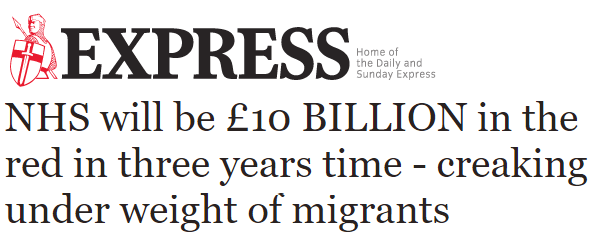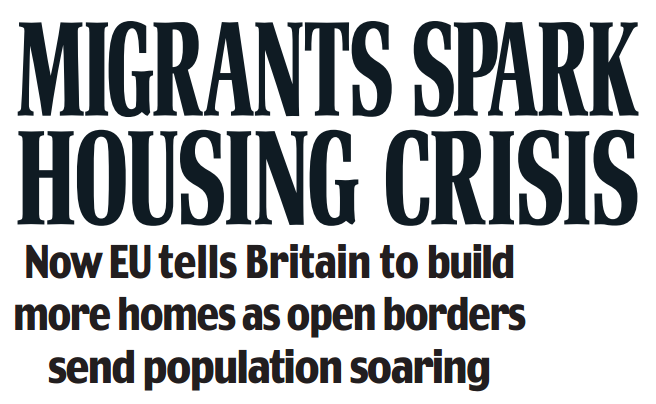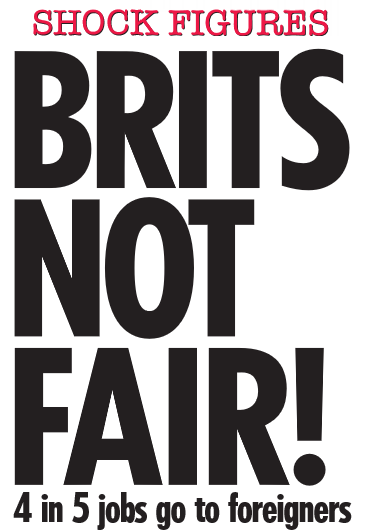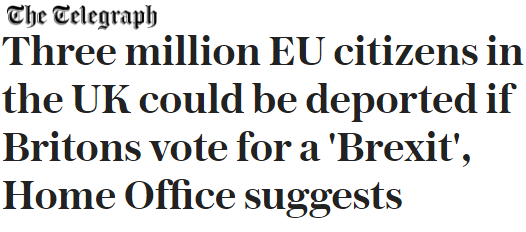The eurosceptic press keeps churning out inaccurate stories about the referendum. In the two weeks since InFacts’ first dossier pinpointed eight “hateful” articles, we have identified six more more misleading stories, mainly on migration.*
We are complaining to the Independent Press Standards Organisation (IPSO), on the basis that the stories contravene its code of practice which calls for accurate reporting.
The Express is the prime culprit in this dossier, as in the first one. The Telegraph, Daily Mail and Mail Online are also offenders for the second time. Two other publications, the Sun and the Times, which have not been so obviously pro-Brexit, feature for the first time in this dossier – which we are calling the “sinful 6”.

1. “EU army plans kept secret from voters”
The Times, 27 May, front page splash. Follow-up stories on Mail Online and Express websites.
The Times quotes plans drawn up by the EU’s foreign policy chief for “new European military and operational structures, including a headquarters”. These cannot reasonably be described as plans to create an “EU army” – a term that would imply military forces under a single command structure.
The Times told InFacts: “Headlines are not read in isolation… The term ‘EU army’ is a common, and in our view reasonable, headline shorthand for the ‘permanent structured defence cooperation’ in question.”
This is not the first time The Times has used “EU army” misleadingly in a splash. On December 16 last year, the same author, Bruno Waterfield, wrote a piece with the headline: “EU army to protect borders”. This was about a coast guard for the Schengen Area. Not only is it a stretch to describe a coast guard as an army; the UK is not in Schengen.
After being contacted by InFacts, the Mail Online amended its “EU army” story, including putting the offending phrase in inverted commas and explaining high up what the plans actually involve and that the Ministry of Defence says “Britain retains a veto on all defence matters in the EU.”

2. “NHS will be £10 BILLION in the red in three years time – creaking under weight of migrants”
Express, 23 May, website
The basis for the £10 billion shortfall is a report by the Chartered Institute of Public Finance & Accountancy, which does not mention migration, but rather largely blames the financing gap on a “leadership challenge”. The article does contain a separate claim that the NHS is creaking under the weight of migrants, but this is from Vote Leave, the official Leave campaign. Merging these two points in a headline was misleading.

3. “Migrants spark housing crisis”
“Britain has been ordered by Brussels to build more houses – to cope with all the EU immigrants.”
Daily Mail, 20 May, front page splash
The word “ordered” is inaccurate. The EU has no powers to order the UK to adopt any housing policy. The Daily Mail is referring to “country specific recommendations” which, as the term implies, are recommendations, not orders.
The Daily Mail said the article “should be considered in the context of Chris Grayling [the eurosceptic cabinet minister] interpreting the ‘recommendation’ as ‘the EU telling us’ how this country should run its housing policy.”

4. “Brits just not fair: 4 in 5 British jobs went to foreign nationals”
The Sun, 19 May, front page splash
The figure of 414,000 from which the “4 in 5” statistic is derived does not refer to new hires. It refers to the net increase in jobs – in other words, new hires minus people who switch jobs, retire, stop working and so on. The proportion of new hires filled by non-UK born workers in 2014 was about 17.5%, according to London School of Economics’ Jonathan Wadsworth. What’s more, non-UK born workers includes not just foreign nationals but UK nationals born abroad, such as Boris Johnson.

5. “EU citizens may face deportation threat after Brexit”
“Three million European Union citizens in Britain might have to be deported in event of Brexit a Home Office minister has suggested, a claim that was denounced as “absurd” by anti-EU campaigners.”
Telegraph, 16 May. A similar story appeared on the Express website.
A Home Office minister did not suggest that three million European Union citizens might have to be deported. There was, therefore, nothing absurd for anti-EU campaigners to denounce.
Lord Keen’s quote, from which the paper derived its story, didn’t even refer to EU citizens in Britain. He referred to UK citizens living in the EU.
6. “Soaring cost of teaching migrant children: £3 BILLION bill ‘another reason to quit EU’”
“The cost of educating 700,000 children from the EU in British schools has hit £3.2billion a year.”
Express, 16 May, front page splash
The 700,000 figure refers to “dependent children aged 5 to 18 with at least one parent who held EEA** nationality”. It is inaccurate to call these children “migrant children” . Such a definition would include Nigel Farage’s children with his German wife. Even children with two parents from another EEA country would not be “migrant children” if they were born in Britain.
The Times ran an inaccurate headline for the same story. After being contacted by InFacts, it promptly amended the headline.
Justice delayed?
It may seem a forlorn task to tackle the press on its inaccurate Brexit reporting. After all, IPSO moves slowly. When Buckingham Palace complained about The Sun’s headline saying “The Queen backs Brexit”, the watchdog took over two months to rap the tabloid over the knuckles.
However, InFacts is having some effect. Not only did The Times correct its headline on migrant children and the Mail Online amend its piece about an “EU army”. After our intervention, the Daily Mail corrected a story saying EU citizens were guilty of 700 crimes a week and the Express changed an article claiming Brussels had dropped an agreement to exempt Britain from the tampon tax.
Meanwhile, 11 MPs have written a letter encouraging IPSO to fast-track its investigation into our original dossier so the electorate is not misled when it votes on June 23. After all, justice delayed is justice denied.
*These stories all appeared after InFacts began compiling its first dossier, although two predated that dossier’s publication.
** The EEA is the EU plus Norway, Iceland and Liechtenstein.
Research by Sam Ashworth-Hayes and Jack Schickler
This article was simultaneously published in The Guardian.
Edited by Geert Linnebank


Useful – thank you!
still wish you would publish constructive stuff eg what GOOD has come out of the EU for Britain and also what DIFFERENT plans would the Remain camp action should the vote be to remain: (industrial strategy, more focus on housing needs, more focus on developing the North economically, more imagination on controlling immigration within EU rules (eg more effective control of non-EU migrants) to name a few examples)
Why would it post the positives of leaving, it supports remain, and so far there are no positives, none, nothing, Nada, zilch!
Telegraph now a gutter press tabloid although it caters for the home counties brigade of people still wanting to live in the days of the Empire.
Why don’t you mention that new investments are at a stand still in London.
The business people from abroad who rent houses in the Holland Park area of London are non existent . My son is moving abroad for two years on business this entails renting out his house (.never had trouble before) it has been on the market for three month , no joy; estate agent say nothing moving as new businesses are all on hold til after referendum as will move to other parts of Europe or America
Stay in Europe essential
As above
Actually, I have a query for you, IN Facts.
John Longworth said of the single market, on Newsnight, on 1 June – ‘ The single market is a mirage. The average tariff is 3% and we can trade perfectly well without it.’
Leaving aside the possibility that, as some have warned, foreign car manufacturers might up sticks in the event of Brexit and destroy car manufacture, how true is Mr Longworth’s statement in relation to all our trade, including the export of services?
The single market goes beyiond being tariff free, a business in the UK can sell as readily to a customer in Munich as it can to one in Manchester.
There is no more required than a simple invoice, with no customs documentation or formalities of any kind. 3% is the average tariff, but it’s higher on certain products, like cars, where it’s up to 10%, so rather more there, especially given that about 80% of the cars made in the UK are exported, a high proportion to the rest of the EU (after all, that’s why Honda, Toyota an Nissan set up manufacturing plants here, to suplly the EU market!)
Many markets are highly competitive and even 3% higher prices can adversely affect sales, 10% certainly would.
I prefer to ask questions to people I am either related to or have many colleagues working in the area of investment either in banking or large corporations . They have had no business investments for the last three month. They are twiddling their thumbs with nothing to do as investments on hold . If Brexit they will take their businesses away from London.
Bloomburg echoed this , on TV this morning. London would no longer be the hub.
If this happens then no need to worry about immigration as we will be economically doomed , so they won’t want to come.
The question to ask is how much is 3% extra cost to trade? Since trade to the EU is worth about 4 Billion pounds a week, it’s a lot. What is fairly certain is it would be more than supposed saving by not paying our EU contribution.
The current level of immigration of 300,000 split 60/40 between EU non EU is obviously about right to support the economy as it stands at present. But as the newer countries economies begin to improve I predict our level of immigration will reduce as those immigrants from those new countries return home to assist with new growth of their economies. It wouldn’t surprise me that in ten years time we will be short of labour and have to embark on a major recruitment drive to keep our economy ‘ticking over’.